必修3 Module 2 Developing and Developed Countries Reading课件(共45张PPT)
文档属性
| 名称 | 必修3 Module 2 Developing and Developed Countries Reading课件(共45张PPT) | 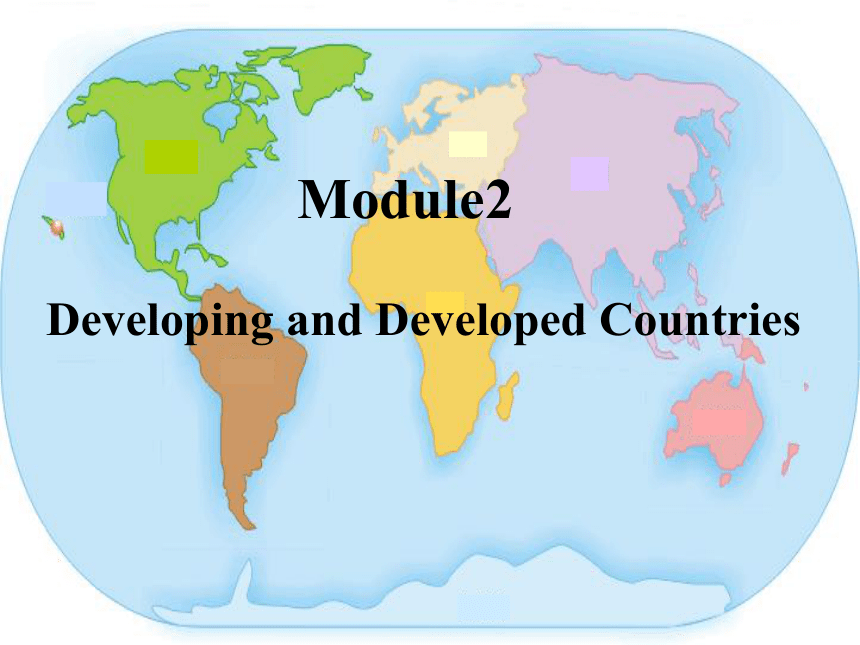 | |
| 格式 | zip | ||
| 文件大小 | 3.2MB | ||
| 资源类型 | 教案 | ||
| 版本资源 | 外研版 | ||
| 科目 | 英语 | ||
| 更新时间 | 2019-02-18 21:05:13 | ||
图片预览

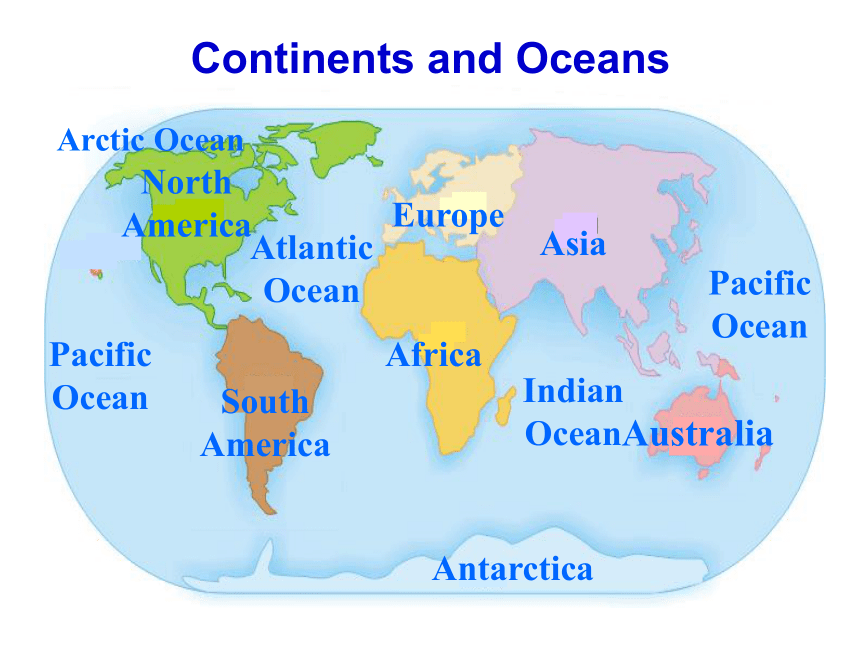
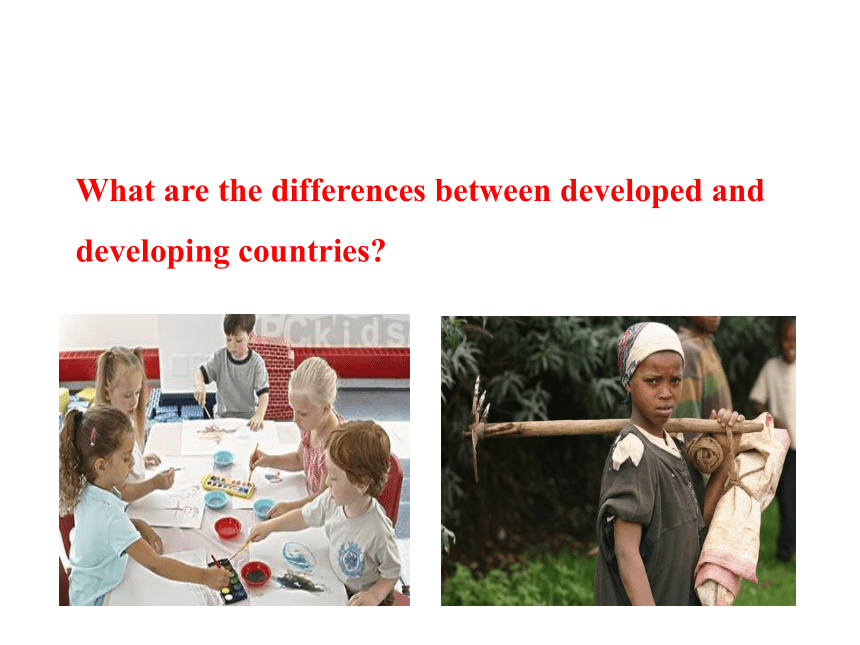
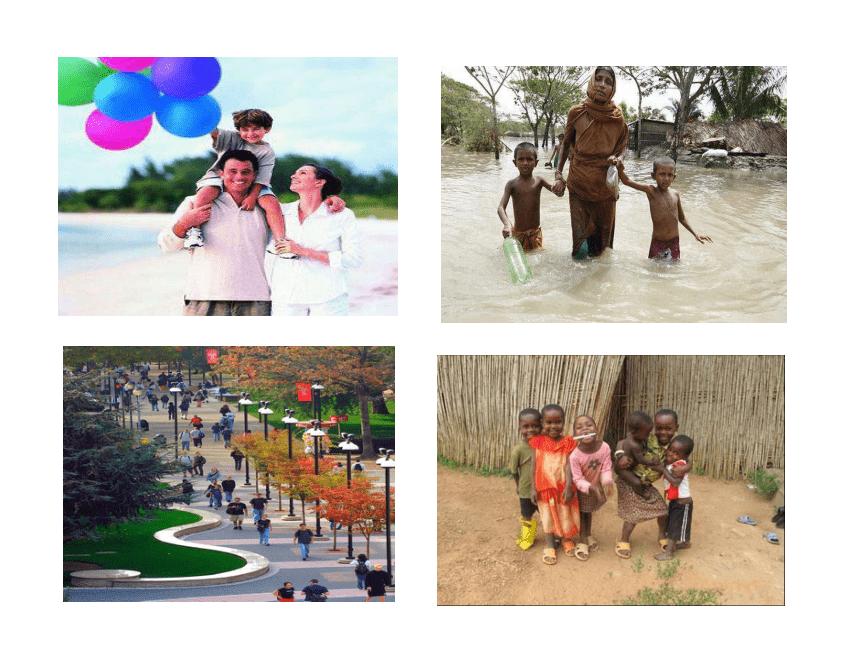
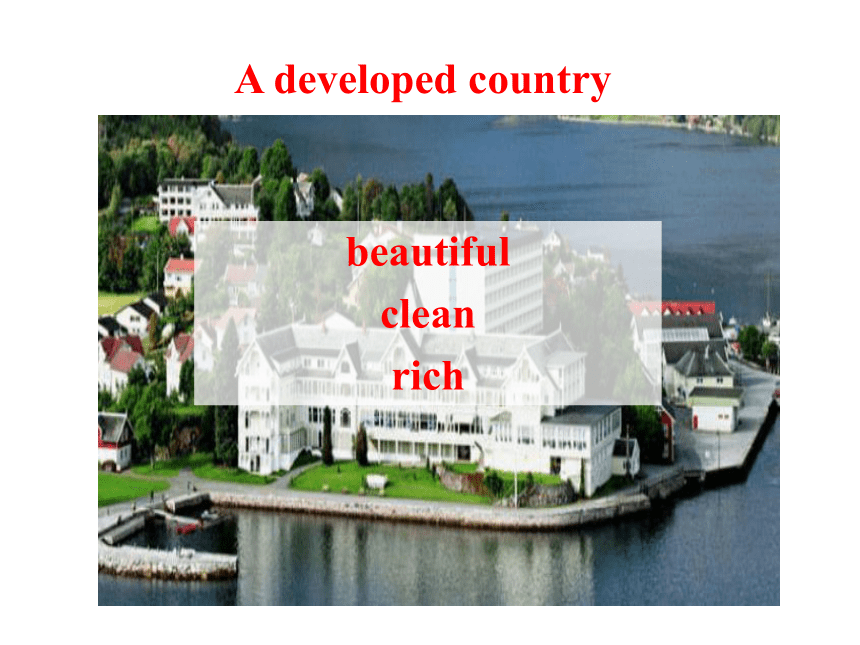
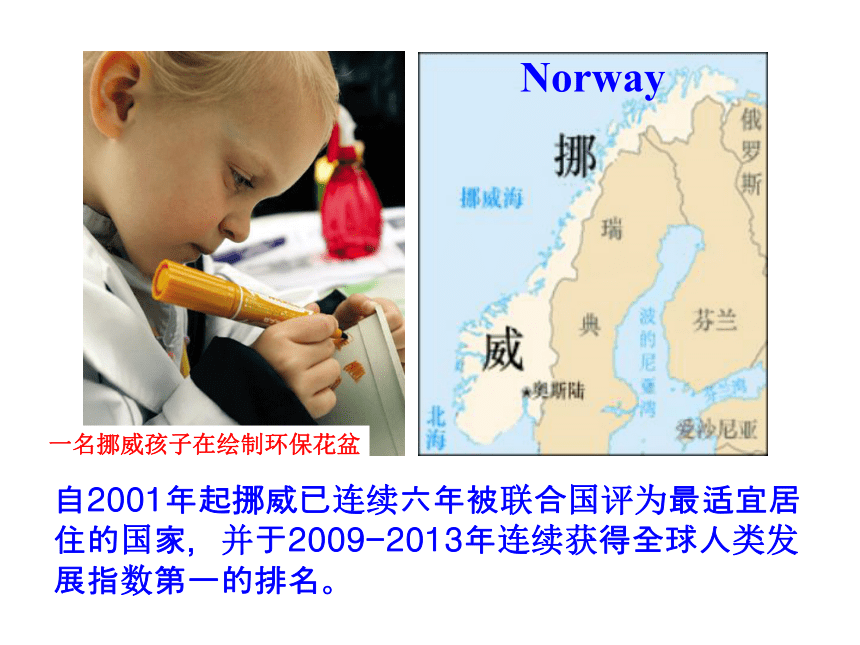
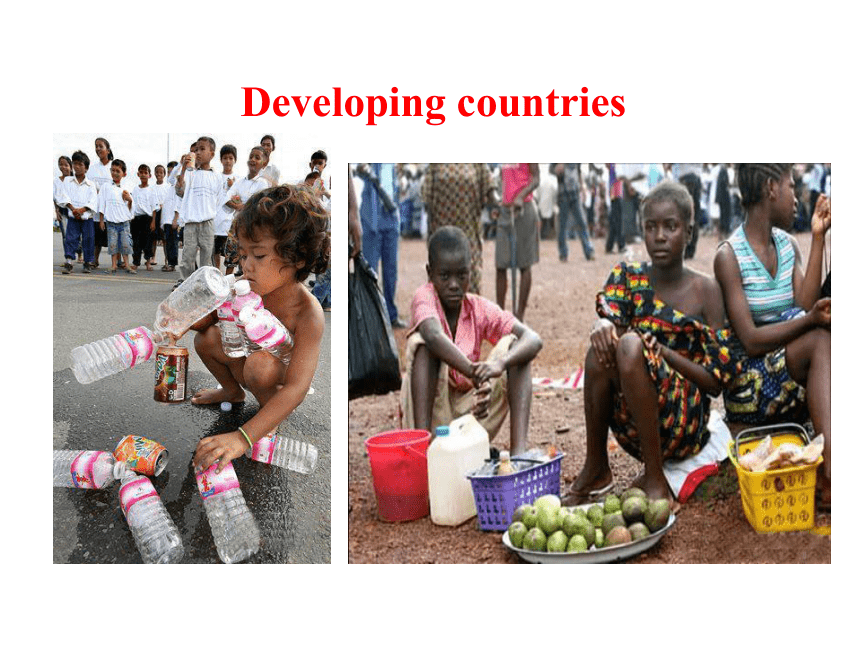
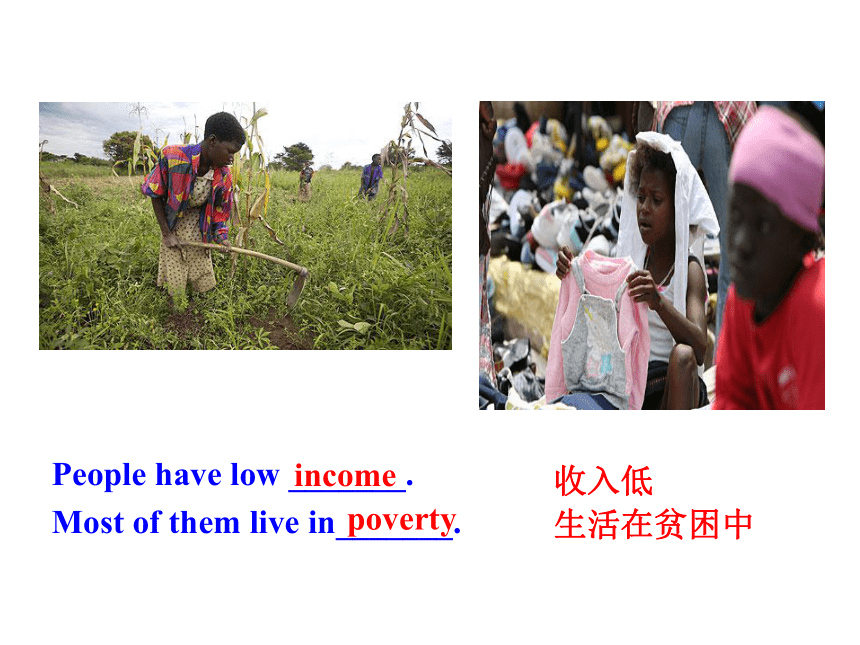
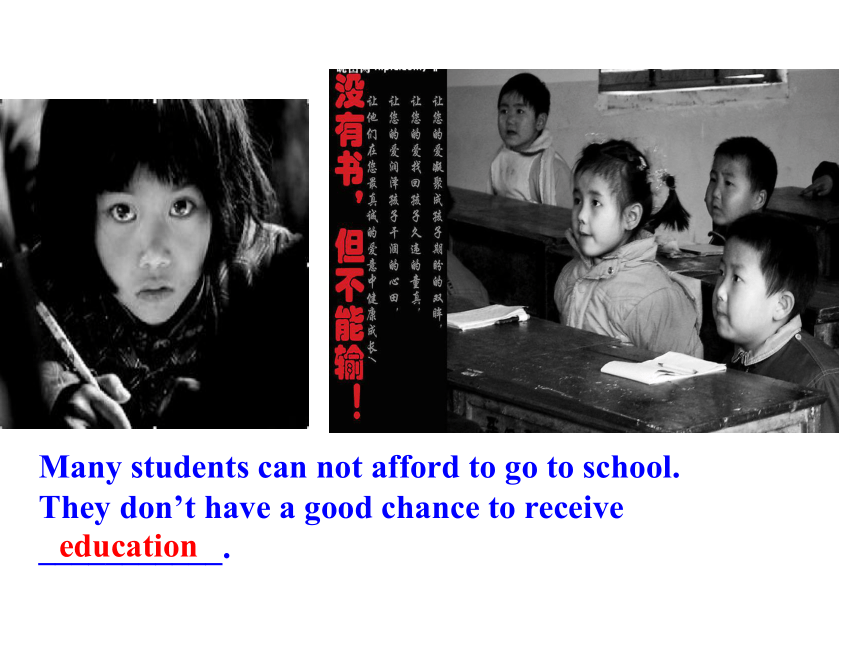
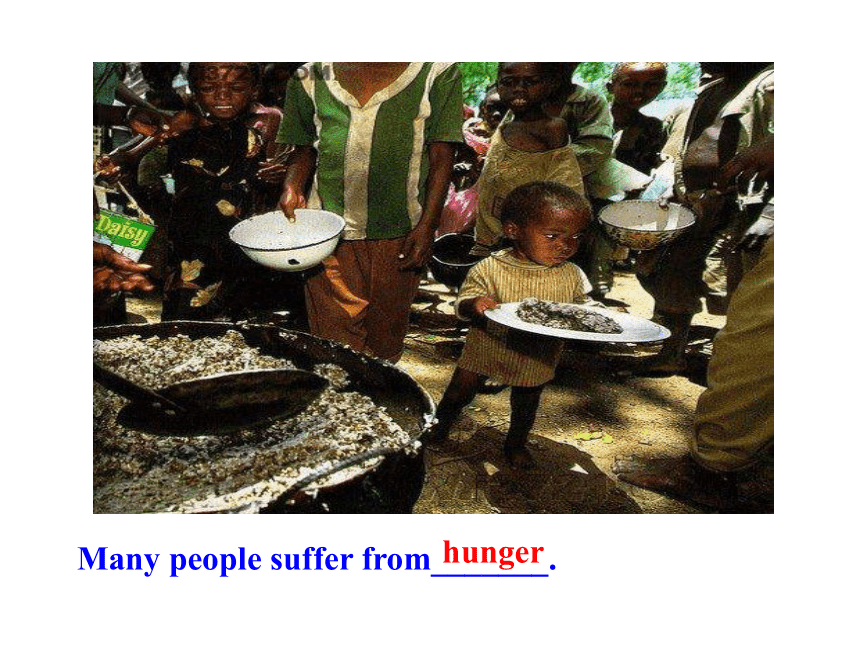
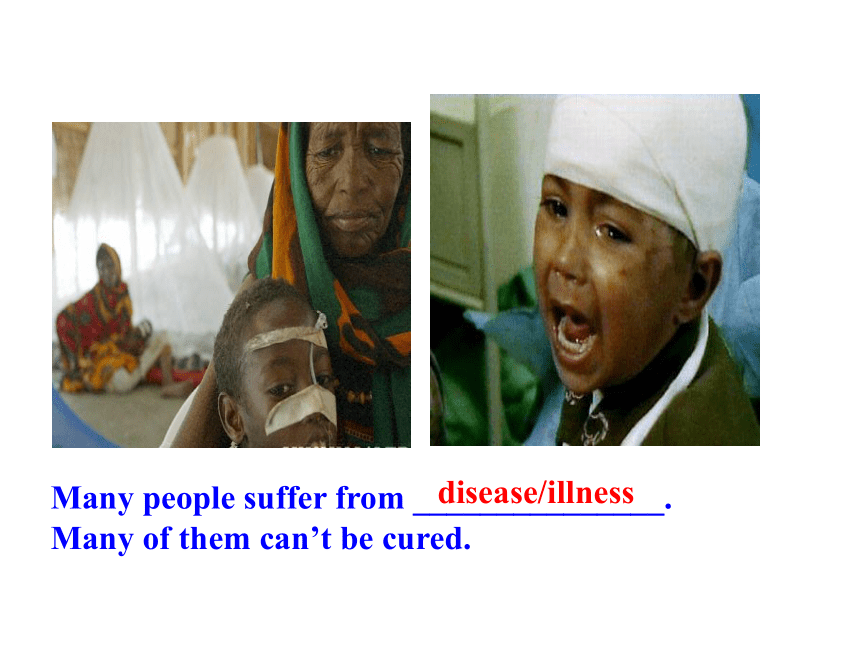
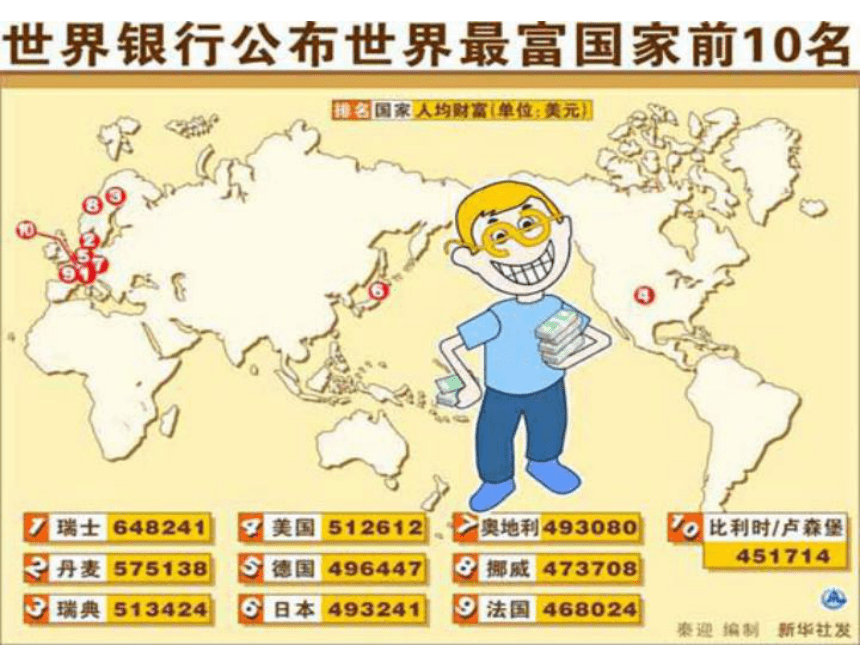
文档简介
课件45张PPT。 Module2
Developing and Developed CountriesContinents and OceansAsiaAustraliaEuropeAfricaNorth
AmericaSouth
AmericaAntarcticaArctic OceanPacific
OceanAtlantic
OceanIndian
OceanPacific
OceanWhat are the differences between developed and developing countries?beautiful
clean
richA developed country自2001年起挪威已连续六年被联合国评为最适宜居住的国家,并于2009-2013年连续获得全球人类发展指数第一的排名。一名挪威孩子在绘制环保花盆Norway Developing countriesPeople have low _______.
Most of them live in_______.
incomepoverty收入低生活在贫困中Many students can not afford to go to school.
They don’t have a good chance to receive ___________.educationMany people suffer from_______.hungerMany people suffer from _______________.
Many of them can’t be cured.disease/illness
Developing countriesDeveloped countriesImbalanceWe should pay more attentionAfricaMost Asian
countriesEuropeAmericaHuman Development Report (HDR)The Human
Development Report (HDR)Para.1Para.2Para.3Para.4Para.5Read the passage carefully and find out the main idea of each paragraphHow the Human Development Report came out.The H.D Index measures a country’s achievement.Examples of successful development in 2003Developed countries should give more financial helpThe most five important goals of the report
Read the text carefully and answer the questions1.what did world leaders agree to do in 2000?2.what does the Human Development Index
measure?4.what do developed countries need to do?They agreed to work together to reduce poverty by 2015
or earlier.It measures a country’s achievement in three ways: life expectancy, education and incomeThey need to give more money.3.What are the first two development goals?To reduce poverty and hunger, and ensure all children are
educated up to the age of 11.Read carefully and finish the exercise at activity 2, Page13. (Para. 2)Top of the listNorwayNumber 7the USNumber 13the UKBottom of the listSierra LeonepositioncountryWhere is China in the list?A
developing
countryIn the middle Read the text again and complete the chart with figures from Paragraph 4.Increase in life expectancy in china(1953—1962)Number of people moved out of poverty in china(1993—2003)Number of hungry people in developing countriesNumber of children not receiving education in developing countriesNumber of people without safe water in developing countries13 years150 million799 million115 million1 billionIn 2000, 147 world leaders agreed to work together
to reduce poverty by 2015 1. _______ earlier. From this
agreement came the Human Development Report. The
report 2. __________(main)includes two aspects. One is the
Human Development Index, 3. _________ measures the
achievements of 175 countries in three 4. _______ (way):life expectancy, education and income. The 5.________(follow) is the Development Goals, and the most important ones
are to: reduce poverty and hunger; make sure that all
children have education up 6. _____ the age of 11; fight
AIDS and other diseases; improve 7. _______ environment
of poor people; encourage 8. _____________ (develop)
countries to give more help to other countries. 9. _________
(base)on some examples, the report finally shows that
we are making some progress but 10. _________ we need to
make greater efforts.
ormainlywhichwaysfollowingtothedevelopedBasedthatWhat are the differences between developed and developing countries?
Income: ( larger / smaller)
Industry and commerce: (flourishing / underdeveloped)
Education: (good / little)
Life expectancy: (live long/short)
Environment: ( good/bad (terrible) )Discussion education,
poverty,
hunger,
disease,
pollution,
fresh water,
population.The main problems in developing countries:What should we do??Hunger ?Poverty
?Education ?Pollution
?……Save water Improve incomeEncourage developed countries to give more help to the developing countries1) The government should encourage people to improve the present condition to reduce poverty and hunger;
2) Don’t waste land and save food;
3) Protect animals;
4) Improve the environment.
……Language points1. Effort C. Uc.
make an effort或make efforts。It will take a lot of time and effort to get an exhibition ready.准备一个展览需要花费很多时间和气力。【拓展】
make every effort 尽一切努力
spare no effort 不遗余力, 极力
with (an) effort 费力地, 使劲地
without effort 毫不费力地, 轻松【即学即练】
用以上所学短语完成下列句子, 每空一词。
我们必须尽一切努力以减缓病情的发
展。
We must _____ _____ _____ to slow down the progress of the illness.
2. 我们应该不遗余力地保护我们宝贵的饮用水不受污染。make every effortWe should _____ ___ _____ to protect our valuable drinking water from being polluted.
3. 我知道你不喜欢她, 但请尽量礼貌一些。
I know you don’t like her, but please
_____ ___ ______ to be polite.
4. 他毫不费力地举起那块大石头。
He lifted the big stone _______ _____.spare no effortwithout effortmake an effort2. …, 147 world leaders agree to work
together to …agree to do同意做某事 (to do为不定式作宾语, to为不定式的符号) agree to + n. 同意某人的建议/计划/安排等。(此处的to为介词)1). He agreed to my plan.
他们同意我的计划。
2). Is he going to agree to our suggestion?
他会同意我们的建议吗?
3). He has agreed to help us out of the
difficulty. Please be relaxed.agree with sb./one’s words 同意某人的观点, 意见, 同意某人所说话1). Do you agree with me about the need for more schools?
2). We all agree with your words/what you said.拓展agree with 除了上面用法外, 还可以用
来表示“与……一致”, “(气候、事物)适合
某人”等。
1). What you did didn’t agree with what you said.
你的行为与你所说的话不一致。2). This kind of food doesn’t agree with me.
这种食物我吃不习惯。
注: agree不用于被动语态。1). We couldn’t agree on a date / when to
meet.
关于日期/什么时候见面, 我们未能取得一致意见。
2). Do we all agree on the best course of
action?
我们是否一致同意这一最佳措施?agree on 达成一致1. We ______ ___ making an early start.
2. The climate here doesn’t _____ ____ him.
3. I don’t _____ ____ ____ to make friends with such a man.
4. The manager has ______ ___ improve
the working condition in the company.agreed onagree withagree with youagreed to用agree 有关词组完成句子。3. From this agreement came the Human
Development Report.当句首状语为表示地点的介词短语时句子要倒装。如:
Round the corner walked a large policeman.
Under the table lay a wounded young man.1). Here comes the bus.
2). Out rushed the students as soon as
the bell rang.
3). In came the teacher with a book in
his hand.
4). Away he went without saying a word.out / in / up / down / away / here / there
等副词放在句首句子也使用全部倒装IV. 根据括号内所给的汉语提示完成下列
句子。
1. Do you know why the government
______________________________
(鼓励人们骑自行车)?
2. A lot of high-rise buildings have been
built _________________ (在最近十年里).encourage people to ride bicyclesin the past ten years3. Our English teacher, Miss Li, came in
______________________________
(胳膊下夹着一本词典).
4. The government has promised to
_____________ (采取措施) to help
the unemployed.
5. In the eastern part of China __________
__________ (坐落着青岛市), a major
shipping centre.take measures lies the city of Qingdaowith a dictionary under her arm6. The medical group continues to _____________ (取得进展) in the fight against cancer.
7. Although we have __________________
____________ (取得一些成绩), we still have a long way to go.
8. When leaving the office, __________
(确保) the door is locked.make progress gained / made some achievementsmake sure9. On the ground ___________________
(躺着一只狗), sleeping, while many
children were under a tree, playing.
10. Please __________ (列一张清单) of
all things you want to buy for the picnic.lay / was lying a dogmake a list
Developing and Developed CountriesContinents and OceansAsiaAustraliaEuropeAfricaNorth
AmericaSouth
AmericaAntarcticaArctic OceanPacific
OceanAtlantic
OceanIndian
OceanPacific
OceanWhat are the differences between developed and developing countries?beautiful
clean
richA developed country自2001年起挪威已连续六年被联合国评为最适宜居住的国家,并于2009-2013年连续获得全球人类发展指数第一的排名。一名挪威孩子在绘制环保花盆Norway Developing countriesPeople have low _______.
Most of them live in_______.
incomepoverty收入低生活在贫困中Many students can not afford to go to school.
They don’t have a good chance to receive ___________.educationMany people suffer from_______.hungerMany people suffer from _______________.
Many of them can’t be cured.disease/illness
Developing countriesDeveloped countriesImbalanceWe should pay more attentionAfricaMost Asian
countriesEuropeAmericaHuman Development Report (HDR)The Human
Development Report (HDR)Para.1Para.2Para.3Para.4Para.5Read the passage carefully and find out the main idea of each paragraphHow the Human Development Report came out.The H.D Index measures a country’s achievement.Examples of successful development in 2003Developed countries should give more financial helpThe most five important goals of the report
Read the text carefully and answer the questions1.what did world leaders agree to do in 2000?2.what does the Human Development Index
measure?4.what do developed countries need to do?They agreed to work together to reduce poverty by 2015
or earlier.It measures a country’s achievement in three ways: life expectancy, education and incomeThey need to give more money.3.What are the first two development goals?To reduce poverty and hunger, and ensure all children are
educated up to the age of 11.Read carefully and finish the exercise at activity 2, Page13. (Para. 2)Top of the listNorwayNumber 7the USNumber 13the UKBottom of the listSierra LeonepositioncountryWhere is China in the list?A
developing
countryIn the middle Read the text again and complete the chart with figures from Paragraph 4.Increase in life expectancy in china(1953—1962)Number of people moved out of poverty in china(1993—2003)Number of hungry people in developing countriesNumber of children not receiving education in developing countriesNumber of people without safe water in developing countries13 years150 million799 million115 million1 billionIn 2000, 147 world leaders agreed to work together
to reduce poverty by 2015 1. _______ earlier. From this
agreement came the Human Development Report. The
report 2. __________(main)includes two aspects. One is the
Human Development Index, 3. _________ measures the
achievements of 175 countries in three 4. _______ (way):life expectancy, education and income. The 5.________(follow) is the Development Goals, and the most important ones
are to: reduce poverty and hunger; make sure that all
children have education up 6. _____ the age of 11; fight
AIDS and other diseases; improve 7. _______ environment
of poor people; encourage 8. _____________ (develop)
countries to give more help to other countries. 9. _________
(base)on some examples, the report finally shows that
we are making some progress but 10. _________ we need to
make greater efforts.
ormainlywhichwaysfollowingtothedevelopedBasedthatWhat are the differences between developed and developing countries?
Income: ( larger / smaller)
Industry and commerce: (flourishing / underdeveloped)
Education: (good / little)
Life expectancy: (live long/short)
Environment: ( good/bad (terrible) )Discussion education,
poverty,
hunger,
disease,
pollution,
fresh water,
population.The main problems in developing countries:What should we do??Hunger ?Poverty
?Education ?Pollution
?……Save water Improve incomeEncourage developed countries to give more help to the developing countries1) The government should encourage people to improve the present condition to reduce poverty and hunger;
2) Don’t waste land and save food;
3) Protect animals;
4) Improve the environment.
……Language points1. Effort C. Uc.
make an effort或make efforts。It will take a lot of time and effort to get an exhibition ready.准备一个展览需要花费很多时间和气力。【拓展】
make every effort 尽一切努力
spare no effort 不遗余力, 极力
with (an) effort 费力地, 使劲地
without effort 毫不费力地, 轻松【即学即练】
用以上所学短语完成下列句子, 每空一词。
我们必须尽一切努力以减缓病情的发
展。
We must _____ _____ _____ to slow down the progress of the illness.
2. 我们应该不遗余力地保护我们宝贵的饮用水不受污染。make every effortWe should _____ ___ _____ to protect our valuable drinking water from being polluted.
3. 我知道你不喜欢她, 但请尽量礼貌一些。
I know you don’t like her, but please
_____ ___ ______ to be polite.
4. 他毫不费力地举起那块大石头。
He lifted the big stone _______ _____.spare no effortwithout effortmake an effort2. …, 147 world leaders agree to work
together to …agree to do同意做某事 (to do为不定式作宾语, to为不定式的符号) agree to + n. 同意某人的建议/计划/安排等。(此处的to为介词)1). He agreed to my plan.
他们同意我的计划。
2). Is he going to agree to our suggestion?
他会同意我们的建议吗?
3). He has agreed to help us out of the
difficulty. Please be relaxed.agree with sb./one’s words 同意某人的观点, 意见, 同意某人所说话1). Do you agree with me about the need for more schools?
2). We all agree with your words/what you said.拓展agree with 除了上面用法外, 还可以用
来表示“与……一致”, “(气候、事物)适合
某人”等。
1). What you did didn’t agree with what you said.
你的行为与你所说的话不一致。2). This kind of food doesn’t agree with me.
这种食物我吃不习惯。
注: agree不用于被动语态。1). We couldn’t agree on a date / when to
meet.
关于日期/什么时候见面, 我们未能取得一致意见。
2). Do we all agree on the best course of
action?
我们是否一致同意这一最佳措施?agree on 达成一致1. We ______ ___ making an early start.
2. The climate here doesn’t _____ ____ him.
3. I don’t _____ ____ ____ to make friends with such a man.
4. The manager has ______ ___ improve
the working condition in the company.agreed onagree withagree with youagreed to用agree 有关词组完成句子。3. From this agreement came the Human
Development Report.当句首状语为表示地点的介词短语时句子要倒装。如:
Round the corner walked a large policeman.
Under the table lay a wounded young man.1). Here comes the bus.
2). Out rushed the students as soon as
the bell rang.
3). In came the teacher with a book in
his hand.
4). Away he went without saying a word.out / in / up / down / away / here / there
等副词放在句首句子也使用全部倒装IV. 根据括号内所给的汉语提示完成下列
句子。
1. Do you know why the government
______________________________
(鼓励人们骑自行车)?
2. A lot of high-rise buildings have been
built _________________ (在最近十年里).encourage people to ride bicyclesin the past ten years3. Our English teacher, Miss Li, came in
______________________________
(胳膊下夹着一本词典).
4. The government has promised to
_____________ (采取措施) to help
the unemployed.
5. In the eastern part of China __________
__________ (坐落着青岛市), a major
shipping centre.take measures lies the city of Qingdaowith a dictionary under her arm6. The medical group continues to _____________ (取得进展) in the fight against cancer.
7. Although we have __________________
____________ (取得一些成绩), we still have a long way to go.
8. When leaving the office, __________
(确保) the door is locked.make progress gained / made some achievementsmake sure9. On the ground ___________________
(躺着一只狗), sleeping, while many
children were under a tree, playing.
10. Please __________ (列一张清单) of
all things you want to buy for the picnic.lay / was lying a dogmake a list
